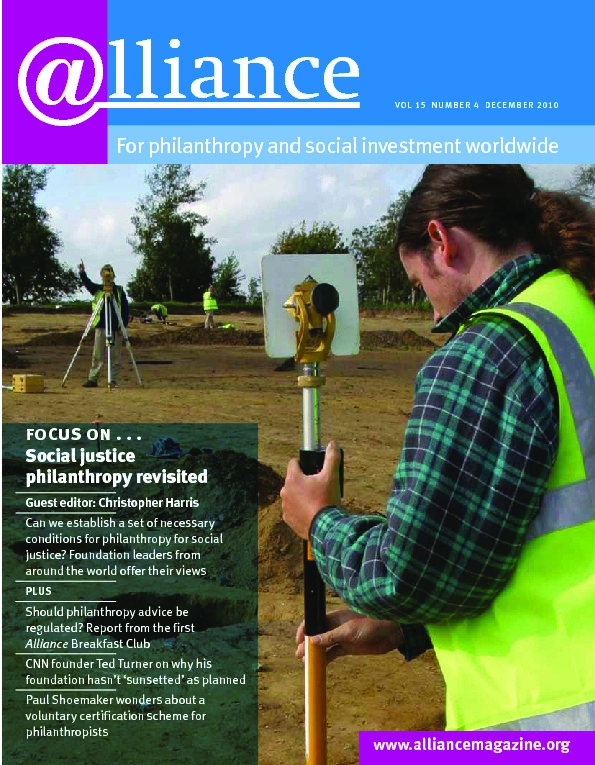Achieving social justice often demands actions that make funders unpopular. For the Community Foundation for Northern Ireland (CFNI), working through 30 years of violent conflict and a tenuous peace process, a commitment to social justice has meant accusatory newspaper headlines, frequent questions in the British Houses of Parliament, threats of protest pickets on foundation offices, and allegations of political partiality – with the director, on at least one occasion, being described by an MP as a ‘leading republican’. Why does this happen? And how do we deal with it?
First, why? Independence is often seen as an affront in sharply divided societies where change is seen as a zero-sum game – what ‘my side’ gains is an automatic loss for ‘your side’, and vice versa. So CFNI has spent many hours, over the years, preparing answers to parliamentary and media questions like (i) how much money has been granted to groups in Catholic/Nationalist/Republican areas as compared to those in Protestant/Loyalist areas; (ii) how many grants have been awarded to ‘innocent’ victims compared to political ex-prisoners; and (iii) how many Catholic or Protestant staff does the foundation employ? Interestingly, the questions are invariably about the allocation of amounts of money, not the nature of the work funded. Although when the CFNI funded work on gay rights, it did receive a bagful of hate mail.
Holding a line
In situations of potential controversy, having a clearly articulated organizational ethos and mission statement has proved to be incredibly important. Guiding principles, such as the belief that the foundation’s ultimate goals must be poverty eradication and the value of increasingly diverse communities, form the bedrock of its decisions and actions. Social justice philanthropy, in a divided and unequal society, cannot simply pursue parity of the cheque book (one grant for this side and one grant for that to keep both happy). It needs to proactively support the empowerment of marginalized groups and challenge concentrations of power that maintain inequality and social exclusion.
Developing evidence to support your priorities is crucial. While some do not believe structural and systemic inequality and discrimination exist, there are others who simply do not know the facts. And while ‘facts’ are never uncontested, research can at least provide a baseline for rational discussion. CFNI believes that such discussion should also be informed by the experiences of those groups that have been most marginalized, demonized and disadvantaged so that research is grounded.
The other important consideration is building a relationship of trust with grant recipients. Being ‘more than just a grantmaker’ means the funder is the first to know if anything is going wrong before critics do. Equally, being prepared to support marginalized groups with the foundation’s reputational capital is a crucial form of solidarity in the face of attack.
Tools in the war chest
According to a leading US political campaign manager who once did training with foundation staff, the contents of a campaigning war chest should include:
- Good communications – both proactive about social change and able to react to criticism.
- A list of potential allies.
- A list of confirmed opponents.
- A list of the persuadable.
It is worth spending time with the persuadable, he argued, in order to understand their reservations and work out how to address them. It is essential to hear what people are saying, particularly in a divided society where communal narratives can be mutually exclusive. Listening to different sections of society resulted in CFNI setting up a specific Social Justice Fund. If it had been called a Human Rights Fund, it would have been seen as Catholic/Nationalist, whereas a Civil Liberties Fund would have been perceived as Protestant/Unionist. Sensitivity to such nuances is imperative.
Finally, you need to build up a circle of critical friends to allow difficulties and sensitivities to be discussed in a supportive – but not unchallenging – framework. Developing the confidence to be open to challenge should not be underestimated because regular attack can result in defensiveness.
But when all is said and done, it’s not just having the confidence and courage to put your money where your mouth is, but your mind and your heart too. And yes, our Derry office is still picketed regularly by anti-abortion groups because we dare to offer office space to the Family Planning Association, which believes in non-directive counselling for women!
Avila Kilmurray is director of CFNI. Email akilmurray@communityfoundationni.org
For more information
http://www.communityfoundationni.org






Comments (0)